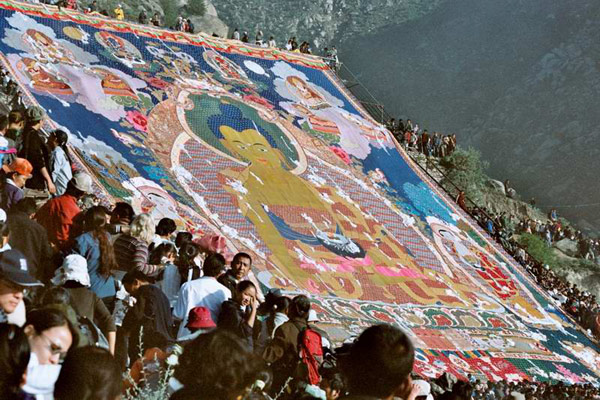Tibetan culture goes on display
 |
|
A giant Thangka painting of the Buddha is displayed near the Drepung Monastery in Lhasa, capital of the Tibet autonomous region during the Shoton Festival in 2008. [File photo] |
The seven-day Shoton Festival, which began on Tuesday in Lhasa, capital of Southwest China's Tibet autonomous region, featured Tibetan opera, folk performances, and yak and horse racing.
The title of the Shoton Festival, also known as the Xuedun Festival, is taken from the Tibetan words "yogurt" and "banquet." The event is an occasion to mark the end of the 100 days of self-cultivation and meditation for monks who were not allowed to leave the monasteries until June 30 in the Tibetan calendar. Tradition calls for the local residents to offer yogurt to them when they leave the monastery.
"Yogurt is said to have the best taste and quality during this time of the year and could increase the monks' brain power," said Sonam Wangden, the deputy curator of the Tibetan Museum. "It also denotes happiness, longevity and everlasting love in Tibetan culture."
After the 17th century, Shoton developed from an exclusively religious observance into an all-out festival for local residents, he said.
Together with the Tibetan New Year, Shoton Festival is one of the most significant festivals in the Tibetan calendar.
"Part of the festival is also rejoicing in the upcoming harvest," says Liu Zhiqun, former deputy director of the Tibet Ethnic Art Institute. "In that sense, it is similar to the Han Chinese Mid-Autumn Festival, but on a much larger scale."
 0
0 






